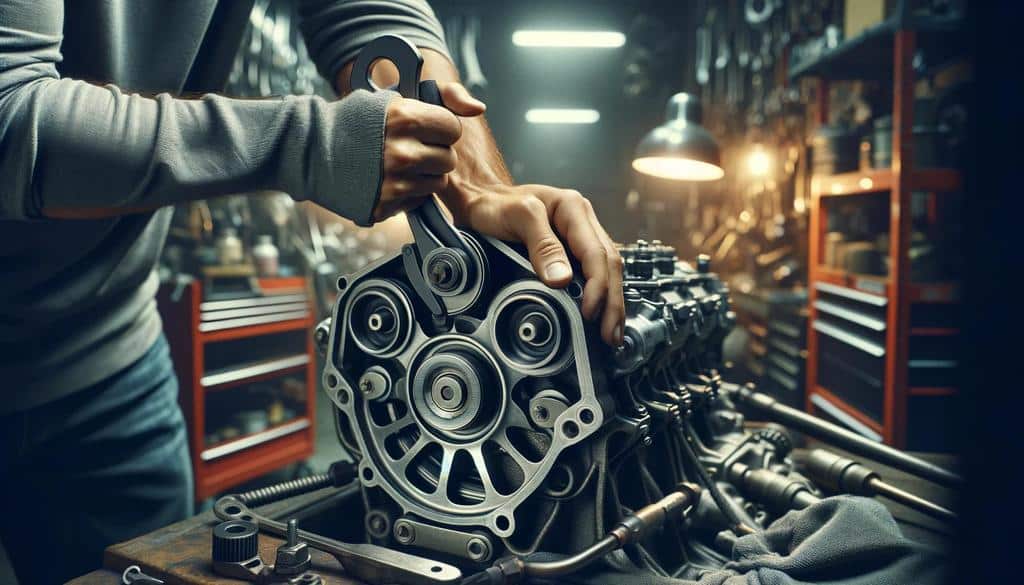Maintenance Tips for Your Pulley Puller: Ensuring Longevity and Efficiency
No mechanic, garage tinkerer, or industrial repairman should be without a pulley puller. This tool is also built with pulley changing in mind and helps to do it quickly and easily so there will be room for the rest of the jobs in your workshop. Nonetheless, if you want to keep your pulley puller in […]

love your engine using a pulley puller to make repairs easier
No mechanic, garage tinkerer, or industrial repairman should be without a pulley puller. This tool is also built with pulley changing in mind and helps to do it quickly and easily so there will be room for the rest of the jobs in your workshop. Nonetheless, if you want to keep your pulley puller in good working order and have it last a long time, then maintenance is essential. Make sure your pulley puller is in good working order with these essential maintenance tips.
1. Regular Cleaning
One of the simplest yet most effective ways to maintain your pulley puller is through regular cleaning. Over time, dust, grease, and debris can accumulate on the tool, leading to reduced performance and potential damage. After each use, wipe down the puller with a clean, dry cloth to remove any residual grime. For more thorough cleaning, use a mild solvent to dissolve grease and grime, followed by a rinse with clean water. Ensure that the tool is completely dry before storing it to prevent rust and corrosion.
2. Lubrication
Proper lubrication is vital for the smooth operation of a pulley puller. The moving parts, such as the screws and jaws, should be adequately lubricated to prevent friction and wear. Use a high-quality machine oil or grease recommended by the manufacturer. Apply a small amount of lubricant to the threads and pivot points, then work the lubricant in by operating the tool a few times. This practice helps ensure that the moving parts function smoothly and reduces the risk of mechanical failure.
3. Inspection for Wear and Tear
Regular inspections are essential to identify any signs of wear and tear on your pulley puller. Check the jaws, screws, and other components for any signs of damage, such as cracks, deformation, or excessive wear. If any parts are worn out or damaged, they should be replaced promptly to avoid further issues. Pay special attention to the alignment of the jaws, as misalignment can affect the tool’s performance and accuracy.
4. Proper Storage
The way that you lead your pulley puller could affect its durability. So, remember to clean and lubricate the tool after use and store it in a dry place due to the least humidity present there. Whenever possible, render the tool secure in a casing or otherwise place it on your shelf. Do not put heavy items on the top of the puller or store them in a bending way that leads to deformation and misalignment.
5. Use the Tool Correctly
It is vital to use a pulley puller as it should be to keep the device intact. Read and follow the manufacturer’s user manuals, and guides before using it. Overworking the tool or using it for applications that exceed its intended purpose can result in wear and tear on not only the motor but possibly other internal components. Also, make sure the puller is square and centered on the pulley before pushing or pulling, non-aligned may result in off-center prying pressure which can damage both the tool as well as the pulley.
6. Regular Calibration
If you do precision work, then some calibration on your pulley puller is in order. With use and wear, the accuracy of the tool can drift over time. You must test the calibration routinely to make certain that the tool is functioning accurately. If needed, refer to manufacturer calibration data and tune the puller accordingly to ensure peak performance.
7. Seek Professional Repair
If your pulley puller encounters any major problems that cannot be fixed by regular maintenance, approach a repair service. Most of us are not mechanics and trying to solve really big problems can make them worse. When you hire a professional, they can troubleshoot and fix your tool precisely so that it gets back to its original state.
Keeping your puller properly maintained is crucial as it is a key component to longevity and efficiency. If you practice these good habits including cleaning, lubrication inspection for signs of wear and tear, proper storage between uses, using it the way it was intended to be used, regular calibration, and having it professionally repaired when needed you can be sure that your pulley puller is going to perform at its best. This increases the longevity of your tool making sure there are no hiccups in its function, this will make it work very efficiently when you need to carry out any tasks mechanically.
